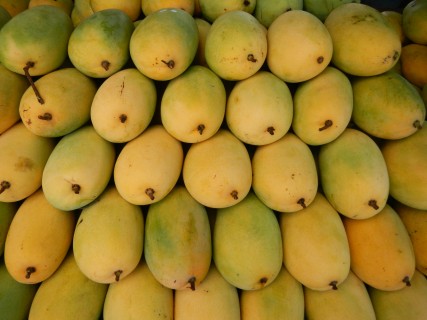Mango is good for your health, says the nutritionist
I first published the article “Jobs Looking for Workers” on May 8, 2011. It was meant to draw attention to food or fruit processing as a major job creator in a country over-blessed by nature. Unfortunately, apart from a few like the Dangote Group and Erisco Foods that have started processing tomatoes in the northern part of the country, little else has changed since then. Yet, as my younger brother Simon Kolawole illustrated clearly in his column last week, those who add value to farm produce reap far greater profits than actual farmers. It’s about time young Nigerians listened to us pro-agric preachers and not wait for government that knows nothing about job creation but more interested in satisfying the criminal demands of politicians.
The story I told five years ago is still relevant. Here is it, slightly edited: I came face to face with Nigeria’s culture of waste while travelling to the south-east for the Easter. In the course of the 450km journey – from Abuja through Kogi and Benue to Enugu states – basketfuls of mangoes were lined up as far as the eye could reach on either side of the road. Unable to resist the urge to have a bite of the mouth-watering juicy fruit, I pulled up somewhere after Ejule in Kogi State. Young women, elderly women and girls soon swarmed over me, begging me to buy from them. “How much?” I asked. And they shouted “N100” and “N50”. At first, I thought they meant the price of one mango. But they were referring to a basketful – some 20 -30 mangoes! Too ashamed to bargain, I simply brought out sachet water from my car, rinsed the freshest two and started eating them. At the end, I poured three basketfuls into the boot and gave the sellers a N1, 000 bill before I zoomed off.
The grateful villagers must have asked God to bless me several times. But they needed the blessings more. They were ready to give away the fruit because they would spoil after that day. What a country! I kept muttering. In no other nation of the world have I ever beheld such spectacle. Right under the mango trees with their fruit, I could see rotten mangoes all over. So nobody needs these succulent fruit? So nobody can export them? Preserve them? If I had the powers, I would have shut down all the universities of agriculture, faculties of agriculture, agric research institutes, ministries of agriculture and natural resources, SMEDAN, NDE and such other agencies that day. I would have forced all professors of agriculture in the country out of their classrooms to start picking all those mangoes I had seen. All politicians organising or attending useless conferences to “move the nation forward” would have got 12 strokes of the cane each.
On my way back to Abuja after the festival, the mangoes were still everywhere. I remember that, in January, it was cashews all the way. In November, it was udala (locally called “apple”). Across Nigeria, travellers are constantly confronted with bananas, oranges, tomatoes, sour shops, pears, grapes and hundreds of other fruit and vegetables that nature has blessed us with. In my home village, a fruit baptised “native mango” – it resembles and tastes even better than the apple being hawked in the cities – made my day each morning. Real honey was never in short supply.
Advertisement
Back in Abuja, I have called my friend, Mr Sonnie Nwosu, who used to sell to me ideas about setting up a cottage industry as a pre-retirement plan. He is the Nigeria representative of an Italian firm that manufactures all kinds of juice extractors but had been frustrated many times by SMEDAN, ministries of commerce and industry and other agencies in Nigeria when he approached them with proposals. In Ghana, however, the machines are selling like fresh palm-wine. How I wish I would purchase some of those machines and take them to the villages where I would have constant supply of fruit all year round.
We Nigerians are perhaps the stupidest people on earth. Despite having everything in abundance, we are still poor and jobless. Many of the trees that grow different fruit were not even planted – they grew on their own, without fertiliser or care. The quantities of fruit that go to waste each year remain incalculable. No government – not even at the local government level – shows genuine interest in agriculture or food processing. Every eye is fixed on oil funds: trillions of naira come from oil, yet there is no power, no water, no good roads, no rail system. Nothing works and nobody works. Jobseekers are everywhere, yet jobs in the agric sector are asking for workers.
Fruit-processing industries alone can employ 2 million Nigerians. Unknown to many, the producers of fruit juice that we import do not have orchards. And see how we fools have been wasting our money on useless and even harmful drinks: certain wines that “rich” Nigerians drink cost more than N60, 000 per bottle. As to imported “fruit” drink – whether it is called 6-Alive, 7-Dead, or Quaking-Cola – there is nothing natural in its content. Local plants import concentrate, then add bags of sugar and flavour. And they get NAFDAC’s clearance!
Advertisement
These wasting fruit would service a million cottage industries. To produce different brands of fruit juice from mango, orange, pawpaw, cashew and others, one merely needs to extract the juice and perhaps add water. Juice extracted from one or two mangoes (a glassful) could sell for N1, 000 at big hotels and restaurants.
For those who hunger for alcohol, my future company will satisfy them. Mixing the gin produced in the creeks of the Niger Delta with my fruit juice can do the magic – a bottle will be able to keep one tipsy for 48 hours.







